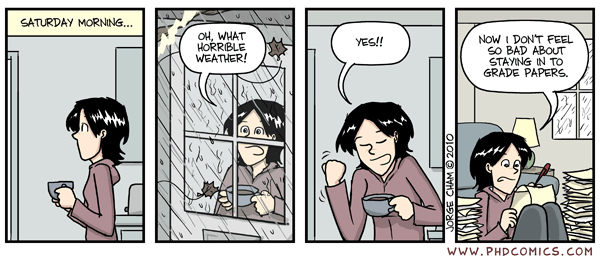 First, to my posts on grading and marking, I must add a wonderful post by not that kind of doctor applying the Elisabeth Kübler-Ross model of five stages of grief – denial, anger, bargaining, depression, acceptance – to the process of grading papers! Wonderful (h/t efdel).
First, to my posts on grading and marking, I must add a wonderful post by not that kind of doctor applying the Elisabeth Kübler-Ross model of five stages of grief – denial, anger, bargaining, depression, acceptance – to the process of grading papers! Wonderful (h/t efdel).
Second, in another grading and marking story, this time by way of comparison with my posts on Andrew Croskery‘s case against QUB, consider the case of a student who sued the University of Pennsylvania for awarding him a degree from their engineering college rather than Wharton School of Business: his misrepresentation and unjust enrichment claims failed.
Third, in one of my posts on the Croskery litigation, I analysed a similar recent case in the Ontario Court of Appeal: Jaffer v York University 2010 ONCA 654 (7 October 2010). There’s an interesting post on the case on the Canadian blog, The Court, This Student Isn’t Just a Number:
(1) Universities: Now, Not-So-Independent Centres of Learning
Perhaps the most interesting and relevant aspect of this case concerns the Court’s finding that academic disputes grounded in contract or tort can be heard by the Superior Court of Justice in Ontario. Karakatsanis JA overturned the motion judge’s finding that academic disputes on the basis of a very recent decision not available to the motion judge, Gauthier v Saint-Germain 2010 ONCA 309.Gauthier establishes that in cases where the elements of a breach of contract or negligence are properly pleaded, the Superior Court will have jurisdiction to hear a claim even when a dispute is academic in nature and arises from the academic activities of the university. While the University argued Gauthier was wrongly decided, Karakatsanis JA clearly addressed and disposed of this line of reasoning, finding that past decisions upholding the dismissal of claims relating to academic matters were done under r. 21.01(1) as the pleadings did not disclose a reasonable cause of action based upon tort, contract or negligence, not on the basis the court lacked jurisdiction.
Karakatsanis JA emphasized though, that the court’s jurisdiction will only extend to academic disputes with causes of action in tort or contract. For internal academic decisions not grounded in a civil cause of action, judicial review remains the appropriate remedy. However, the court will (and does) have jurisdiction to hear claims with a basis in tort or contract – the scholastic nature of the dispute is irrelevant.
In my opinion, I agree that this is the correct outcome. Establishing this guideline will only allow those claims with more substance than a single student’s biased belief or personal grudge to be heard. We must remember that students agree to be subject to their institution’s discretion in resolving academic matters upon enrolling, and only substantiated academic issues should be brought before the Superior Court.
Finally, for those who have reached this far, a cartoon from PhD Comics about the realities of weekend marking (click on the image for a bigger version):
 |
Sigh. I’ll be marking in the not too distant future. My poor family are already prepared for the bad mood which will result.